Ahoy, squirts! Quint here. Over the years there have been a solid handful of interviews I've done for the site that never made it to publication. Some of them didn't make the cut because I fucked the interview up and didn't pull readable answers out of my subjects, some of them just got lost in the pile and were irrelevant by the time I finally caught up to them and then there's the one I'm sharing today, which doesn't fall into any of those categories.
Back in 2013 I had the pleasure of spending nearly two hours on the phone with Bill Paxton for a lengthy AICN Legends interview spanning his career. He was driving from LA to San Diego and talking to me the whole way.
It's a great in-depth chat in which he talks about a lot of his early career, his major influences and shows his cinephile side pretty clearly. So why did I sit on it?
The reason why I never ran it is simple: At 10,000 words it wasn't long enough.
We talked for an hour and forty minutes and didn't get to some of his best work. At the end of the chat he gave me his cell phone number and promised a follow up once things settled down in his life, so I decided to hold off and run the interview in two parts back to back once the follow up happened.
However he stayed busy, I got busy and before I knew it a year had passed. Then two. Then I felt weird about reaching out. Now, of course, I wish I had.
The conversation we had was too good to disappear altogether, so when I heard of his passing I knew I wanted to dig up those audio files and transcribe them. We talk a good deal about his early years in the business, how he first came to Hollywood, his relationship with James Cameron and get to cover Terminator, Weird Science and Aliens in depth. And I even brought up one of his earliest film roles, a bit part in one of my favorite crazy '80s horror movies Butcher Baker Nightmare Maker.
Below you'll find stories you might have heard him tell before, but I think most of this will be pretty fresh. He says in the interview that he usually doesn't like looking backwards and doesn't do many of these kinds of things. There's even one story he claims to have never told before at all (about some surprising visitors that showed up one day on the set of Aliens) until this interview. I don't know if he told this story in the years since, but it's still pretty awesome.
But most importantly this chat gives you a glimpse at the man himself. Notice how many good friends he mentions, how many names he remembers of the “below the line” people on his film sets. I deeply regret never getting the follow up interview so I could pull stories about Tombstone and A Simple Plan and Apollo 13 and True Lies and Twister out of him, but I'm incredibly grateful to have been able to have the conversation I did get with him and that I got a chance to let him know how much of an impact he had on my life.
It's going to be a bit of a bittersweet read, but I promise you it's worth it. Enjoy this conversation with the late, great Bill Paxton.
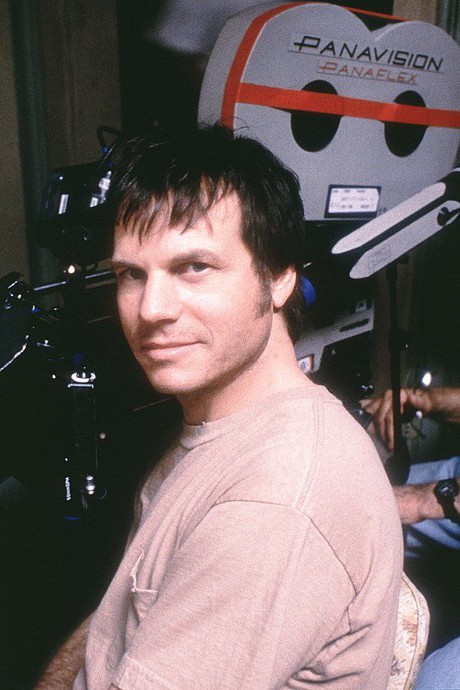
Quint: Hey, how's it going, man?
Bill Paxton: Hey, I'm okay. Where are you at?
Quint: I'm in Austin, TX.
Bill Paxton: Austin! Okay. The ol' headquarters is there, huh?
Quint: Yeah, there's still a few of us Ain't It Cool boys left here in Austin.
Bill Paxton: How's Harry doing?
Quint: He's doing great, man.
Bill Paxton: Well, give him my best. I haven't seen him in quite some time.
Quint: Was it SXSW that you saw him last?
Bill Paxton: I remember seeing him at a screening for Frailty in Dallas years ago, but I think I did see him at SXSW. That might have been before that, even. I was down a few years ago with my family for an Austin Film Society event and I think I might have seen him there, too.
Quint: Edgar Wright told me that you were a fan of The World's End.
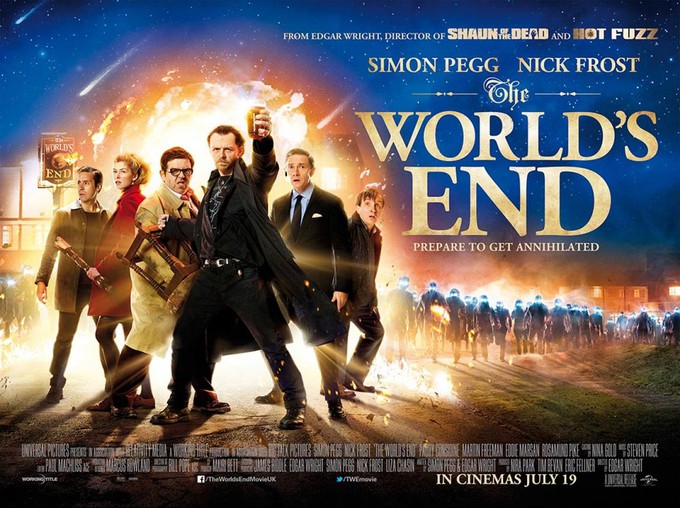
Bill Paxton: Oh, I'm a huge fan of those guys! I think Edgar is a very assured filmmaker and God... Simon (Pegg) and Nick (Frost)... you won't see any better performances in a movie, comedy or drama, this year.
Quint: Nick especially in that movie is great. I love when he Hulks out halfway through.
Bill Paxton: It's amazing to see their performances. They really get where comedy comes from. It comes from character and situation, but without character situation is nothing. Those guys are able to go from zaniness to complete poignancy in the same scene. As a performer in films, for as long as I've been in 'em, that's a rare commodity, to see people that good. If I was a voting member of the Academy I'd push those guys for Oscars.
Quint: I totally agree. Comedy is so often overlooked.
Bill Paxton: So many times in comedy the performer is trying to get a laugh and with these guys the characters don't know they're being funny, which makes it great. When I've succeeded in comic roles it's coming from the same place. I really respect what they do. I just hope American audiences are hip enough to recognize the genuine article when they see it. Now that's a quote! (laughs)
Quint: Even if audiences don't find them right away I've noticed that those kinds of performances have lasting power and will build an audience over time.
Bill Paxton: Well, of course. They're grounded in something real. They're grounded in real humanity and that's why they stand up to the test of time. They're classics. Really, if you boil that movie down it's about a guy who never grew up... he's trying to get the old gang together. It's a classic situation: friends are trying to come to terms with this one buddy who never grew up. It's very true to life, so that's why it has resonance.
Quint: Not to make this whole chat about The World's End, but what I love about the movie is that even though it's the darkest movie of the Cornetto Trilogy in a weird way it has the happiest ending for all the characters involved. Not humanity as a whole. We're pretty fucked, but everybody in that group gets everything they want.
Bill Paxton: (laughs) Absolutely. It's a great ending. I thought the whole thing was so well done. I enjoyed hanging out with them. Another fan of Edgar's who was there that I enjoyed hanging out with afterwards was Alfonso Cuaron. That's a guy who appreciates good grounded humor.
Quint: That guys knows what he's doing. Children of Men is one of my favorites.
Bill Paxton: He's a great guy and a very humble guy, another great filmmaker.
Quint: The impression I get from your directorial work is that you're very heavily influenced by the masters, Hitchcock in particular with Frailty. It got me thinking that you can't be a good director without being a movie fan, so I assume you're a movie buff.
Bill Paxton: Oh yeah. Go all the way back to the beginning. My heroes were Buster Keaton and people like that. I'm pretty much addicted to Turner Classic Movies. I love watching Robert Osborne. He invited me to guest host at the beginning of this year and I showed a couple of films. I tried to pick films that represented the diversity of my interests and also I was trying to pick some films that were a little more obscure.
All of us love Citizen Kane and To Kill A Mockingbird... they're classic films, but they show those a lot, so I showed a film by my favorite filmmaker, Hal Ashby, starring my favorite actor... I showed The Last Detail. Then I showed... You know, Robert Altman died a year ago and it didn't seem like his passing was very well marked by this country. He's one of the greatest American filmmakers of all time. I showed California Split, which is a movie he did that Elliott Gould and George Segal starred in.
Then to mix it up a little bit I showed perhaps the greatest film out of Spain in the '70s called Spirit of the Beehive, which is not as well known. Then I showed Fellini's technicolor movie Juliet of the Spirits.
Robert Osborne said to me “You have no idea how many people will be exposed to these films for the first time because you and I are showing them and talking about them on TCM.” I thought that was a high compliment.
Quint: Absolutely. The more people who are exposed to the films of Hal Ashby the better. Also early Altman. I'm a huge fan of a movie he did around then called Brewster McCloud.
Bill Paxton: With one of my favorite actors, Bud Cort! Harold & Maude was a seminal movie for me. It was the movie that made me want to move to Hollywood in the first place. That movie was what galvanized me to go to my father and say “Dad, who do you know in Hollywood? I'm going out there. I want to work in the movie business.”
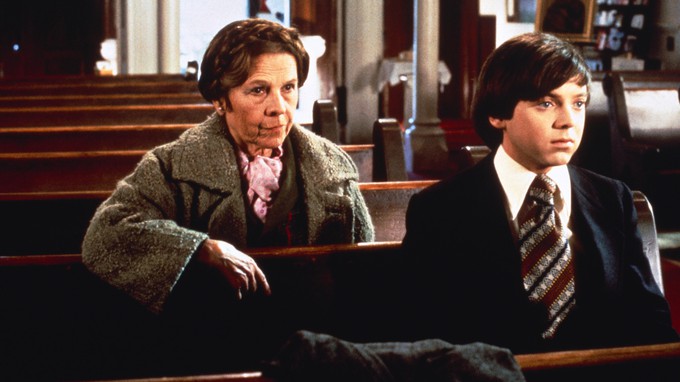
Quint: That's awesome. That's a particularly interesting movie to give you the bug.
Bill Paxton: That one gave me the bug big time! The other movie that had a really big influence on me was Woody Allen's movie Play It Again, Sam.
My father, from a very early age, took me and my older brother to the movies every Friday night or Saturday night and we always went to films he wanted to see. We'd come out of the films and even when I was 6, 7, 8 years old and he'd be deconstructing the film. He'd be talking about the lighting, the art direction, the clothes the characters were wearing, the story, everything. So, from a very early age I was cognizant of the illusion itself and I fell in love with that illusion. I've been a lifelong student of film because of my father.
Quint: So he framed it as art, not just something fun to do as a family.
Bill Paxton: Exactly. He took me to all kinds of films. I remember going over to the Northside when I was a kid with my brother and seeing a Mexican film with no subtitles on it just because Cantinflas was in it, the famous Mexican comedian. I had a unique upbringing in terms of my exposure to film, from a very early age.
Quint: You were really young when you moved out to Hollywood, right?
Bill Paxton: I was eighteen years old. My dad used to do a lot of business out here. I grew up in Fort Worth and at 18 I flew out here, he gave me a plane ticket and said “Look, I'm going to be coming out to LA in about a week. I'll drive your car out.”
He was able to help me get a job with a producer named Milan Herzog, who was this guy who produced these 16mm what we'd call “Industrial films” for Encyclopedia Britannica. This guy had offered me a job for about 2 weeks, but it started right away. My dad said, “Get yourself out there, book the job and I'll be out there in a couple weeks.”
This was January of 1974. I flew out and I was picked up a kid named Todd Hoffman. He was an actor, he was in Meatballs. He picks me up, he's working at the Beverly Hills Hotel. My dad sent me and said “When you get to LA go to the Beverly Hills Hotel and look up Smitty.” Smitty was a very famous doorman named Leon Smith. Him a guy named Ronnie Jones ran the parking concession at the Beverly Hills Hotel. These doorman were two of the wealthiest guys in Beverly Hills!
So, he told me “Go see Smitty and he'll get you squared away.” Todd Hoffman was working as a carpark and I found out later he was an actor. He picked me up at LAX and drove me to the Beverly Hills Hotel and I met Smitty. He goes “Are you looking for a place to stay?” I said, “Well, yeah.” There were some cheap hotels sorta behind Wilshire, he recommended a place and I got a cheap room.
I remember I had that afternoon off, so I walked from Beverly Hills. We had passed 20th Century Fox coming from the airport and I could see it had a pretty extensive backlot, most of which was left over from Hello, Dolly. I remember walking over there... it took me about an hour from where I was staying. I walked around the perimeter of 20th Century Fox there in Century City, just looking into that magical lot thinking “Man, I'd love to go in there and look around.” Just the idea that I would ever even have the opportunity to work in a lot like that at a studio was beyond my wildest dreams.
Quint: I bet. I remember my first time in LA I was kinda starstruck just by the city itself. As a movie fan you see history in everything.
Bill Paxton: Unfortunately, Hollywood has never been a town that's really valued its own history. That's more of a recent development. When you go back to Buster Keaton and the silent days once the films had their run they were pretty much just thrown in garbage heaps. Nitrate film was unstable and they just had no concept that someone would be remotely interested in viewing a film later on, as we understand now with our film preservation. It's a modern conceit to think we're making something for all time.
Quint: It blows my mind that movies, big movies, that were made in that era just simply don't exist anymore. Thousands of them that are just gone forever.
Bill Paxton: Gone forever. Obviously we see it as a tragedy, but in the mindset of the time they didn't even think of that. They were made for commerce and once their commerce was done, boom! It is too bad to think there are many films I'll never see.
But that was my first day in Hollywood. I worked for two weeks on this Encyclopedia Britannica film called Gateway to the Humanity. I was paid $25 a day and we were shooting in this one sound stage lot over on Pico near Fairfax called Carthay Studios. I remember there was this big white backdrop and I had to keep painting it with a roller to keep it white. I'd run down the street to McDonalds to get the coffee.
I met a troublemaker there, who I became friends with, named Kent Smith and Kent introduced me to a friend of his named Peter Jameson, who was getting ready to art direct his first Roger Corman movie, Roger Corman being the only feature length producer/studio (New World) that would actually hire non-union people.
So, I was able to get a job as a set dresser on a movie called Big Bad Mama, which was my first feature film and that was in the Spring of '74.
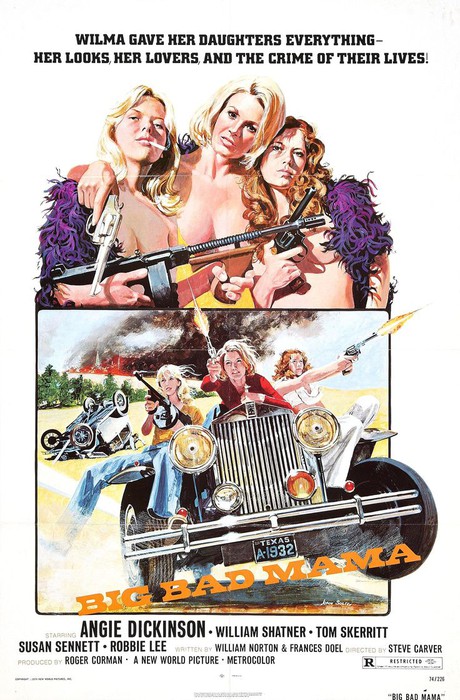
Quint: So, you jumped into the Corman stuff pretty quickly then.
Bill Paxton: Oh yeah. I did that for a couple of years and then I went to New York. I got into a program at NYU. I tried to go to film school after working a few years in LA, but I had horrible SAT scores. It's really horrible to be taken to task for some test you took on a Saturday morning at 8am when you're in the 11th grade. I had worked in the industry, I was making my own films...
The first guy I ever made films with was a guy out of Fort Worth called Tom Huckabee. Tom and I started making films before I came to Hollywood at the age of 18. He moved out here about a year later and we lived together with another Texas guy named Danny Martin. We made several short films. Then Tommy introduced me to another great filmmaker, from Dripping Springs, Texas, who is now more known for his fine arts photography, but a great artist and a great old friend named Rocky Schenck.
A lot of Rocky's work was bought by Bill Whittliff and put in Georgetown University. They have a great collection of Rocky's work. Rocky and I made a lot of rock videos together, but we made a film back when we were both 21. He got him a big grant at AFI and we made this 28 minute black and white short set in the 1920s called The Egyptian Princess. You should try to pull that out! It's a great piece of work.
[I did indeed find it, or at least 2/3rds of it... The third piece had a copyright claim on it and wasn't viewable in my region, but I embedded the first two YouTube videos below!]
We snuck into all the great movie palaces in downtown LA. I remember I was dating a gal named Carrie Underwood and she worked in the box office kiosk at the Pantages Theater. They were showing All the President's Men at the time and we would sneak in before the last feature was over. She would let us in and we would wait until they closed the place down and we had a package of sun guns and... get this, we would rent a Super 8 camera. We didn't even have enough money to own a camera. We would rent a Super 8 camera and we'd rent it on a Friday afternoon so that we could have it until Monday and get a free day out of the rental.
We would set up these sun guns and we shot these beautiful interiors of all these old movie houses we snuck in and we made it look like elaborate sets for our film. We didn't shoot them as movie palaces.
I'm the lead in that movie and Rocky was the director and we produced it together, but after that and working in Hollywood for a few years I wanted to go to New York and I wanted to study acting. I couldn't get into film school, I got turned down by USC and UCLA, so I decided to go to New York and study acting instead.
NYU had a new program where they would offer the undergraduate the chance to study at one of the four professional acting studios and then take academics to get a bachelors of fine arts. I went for two years and I was in the program studying with Stella Adler, who was Marlon Brando's teacher.
I thought “That's the guy I want to be like,” so I studied with Stella. I wasn't a star pupil by any means, but it was remarkable that I had a chance to be around this woman who was such a mover and a shaker in terms of modern acting in film.
Quint: Was there a noticeable difference for you in how you performed before and after studying with Stella Adler?
Bill Paxton: Oh, God. I was a complete novice at that time. I had only done little Super 8 films. I had been in some high school plays. I was starting at the ground floor. I learned a lot from her and the thing I learned most from her, I'd say, was how to understand the tone of a piece. I remember doing a serious story and she stopped me before I started saying “Okay, how did you get in my class? Darling, you're not ready for realism.” (laughs)
She had me do a lot of heightened characters and weirdly enough that's how I started getting noticed in Hollywood, playing the kind of characters that were heightened. Characters like Chet in Weird Science and Hudson in Aliens and Simon in True Lies. These are all characters who are lifted up for the piece.
The biggest debt I owe as far as an acting teacher is not Stella Adler, it's a man named Vincent Chase. He was the last of the old studio coaches. He worked for MGM when the studio system was still hiring people based on their looks and putting them through a whole training process at the studio, where they'd be groomed in terms of poise and acting.
Vince I met in 1982. I got my first break in a major film, in a minor supporting role. The movie was called The Lords of Discipline. That movie was shot in England and while there I met two actors and I was very enamored with their acting. They were both had completely different styles of acting. One was Michael Biehn, who had more of a cerebral or interior kind of approach to his work, and the other was an actor named Rick Rossovich. Rick ended up doing Top Gun, playing Val (Kilmer)'s wingman. Rick's style was very demonstrative, very physical, but also very effective.
I came to find out, after becoming friends with both of them, that their only training had been with this guy Vincent Chase. I said “I got to meet this guy, Vincent Chase.” They made the introduction, and this was 1982, and my latest character in 2 Guns, a character named Earl, is something I completely built with Vincent Chase. I've been working with him continuously for... God, how long is that? 30 years?
Quint: You put him in Frailty as well, right?
Bill Paxton: In Frailty he's the pedophiliac demon I have to dispatch. There's the great shot where he's dragging the girl by her feet out of the car and I pull down the shade and I say, “You didn't think anybody saw that, did you? But God saw it!” I pull that shade down and good Lord! That's it, boy! When the shade goes down that's when we put a little hair on the wall!
Vince is also in the first movie I produced, which is after Twister. It's actually a movie I premiered at South By Southwest and man, I got a lot of support from Robert Rodriguez and Mike Judge and Richard Linklater and Quentin Tarantino showed up for it...
Quint: Traveller?
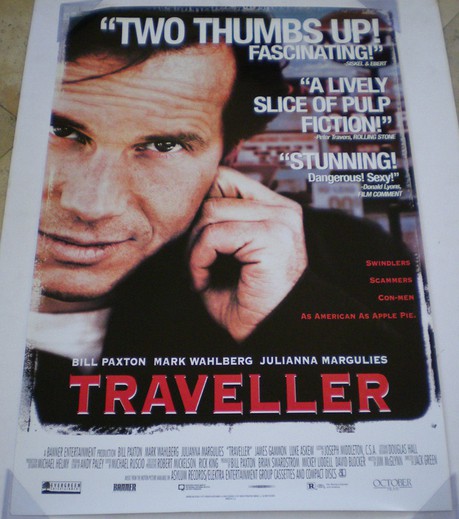
Bill Paxton: Yes, it was a movie called Traveller that I co-starred with Mark Wahlberg. (2 Guns) is the first time we've been in a film together since then, although I've enjoyed watching Kid Millions' rise through fame and fortune.
Quint: I was actually at the premiere of Traveller, at the Paramount Theater. I was there!
Bill Paxton: Oh my God! Eric! Buddy! Man, we go back a ways!
I remember I went down to the theater that afternoon, the ol' Paramount there, just to check it out and I was talking to the program director and they said “We thought we'd have you guys come down to the middle of the stage and introduce the film.” I'm looking at those balconies on the side and I said “It would be a lot cooler to be sitting up in the balcony and address the crowd from the balcony.”
They said that would be fine. Julianna (Margulies) was down there with us, as was Luke Askew, a great actor who passed away last year (2012). His passing went unheralded as well. He was 80. The last thing we worked on together was The Greatest Game Ever Played and he was also in Frailty, he was the sheriff. I was able to get him on as a semi-regular on Big Love, which he was great in.
Anyway, we gave the introduction and I was wearing these great cowboy boots, so I sat back and put my feet up on the balcony railing because I thought as the audience was watching the film they could look up and see those cowboy boots and they'd know that I was there watching the movie with them.
Quint: (laughs) That idea worked! I was going to mention the cowboy boots, actually. I have very vivid memory of seeing them hanging over the rail of those Lincoln Boxseats.
Bill Paxton: A lot of fun. I love that scene down there. The idea of making films outside of Hollywood just interests the crappin' hell out of me and I have just a little bit of envy for what those guys who I mentioned earlier have been able to do down there.
There's a great writer that lives in Austin named Brent Hanley, who wrote Frailty. He's got a new script called Bugs that I've been trying to get Robert Rodriguez to read. I think it'd be a great movie to make down at Troublemaker down there.
Quint: That'd be great! Any movies that can be done in Austin are welcome. We're losing so much work to neighboring states with better tax incentives.
Bill Paxton: Absolutely. I would love to come down there and make a film. I've rarely shot in Texas, but I've always enjoyed being down there. And, God... the idea of just making your own films outside of Hollywood has always appealed to me. I've tried to generate that. Traveller was a step in that direction. Frailty was. Then I tried my hand at a studio film, which was The Greatest Game, but I have yet to become an independent enough filmmaker. That has been my lifelong goal.
Quint: I revisited Frailty leading up to this interview. I saw it theaters and I was a big fan of it then, but it's been a while since I've revisited it. So, I popped it in last night and not only does it hold up for me, I think I like it even more now than I did then.
Bill Paxton: It's a classical piece in many ways. I saw that when I read Brent's original script. It had real good, classical architecture to it, but it also earns its twist. It doesn't try to pull the rug out and create some deus ex machina situation. It really does build to what it is. I'm very proud of that film. It has a very classical look and that's designed on purpose. That was very much done after Hitchcock. To help facilitate that, I was able to get a great, classical director of photography, Bill Butler. I think he must have been 80 years old when he shot that film, but God was he good.
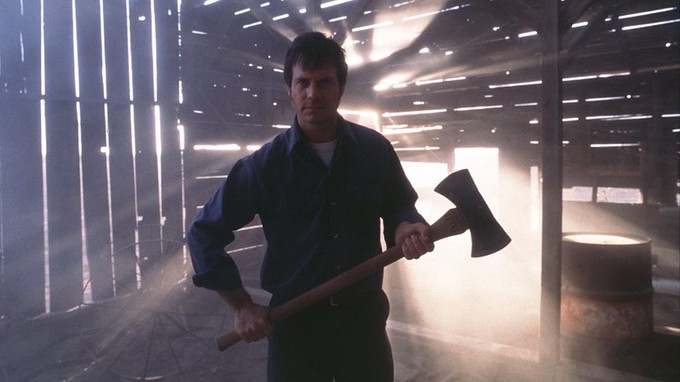
I did a little featurette on the making of the film where I got to pay homage to him. It was a great sequence about what we call Poor Man's Process, when Matthew (McConaughey) and Powers (Boothe) are driving in a car at night and that's all done on a stage.
Quint: Like an old noir movie, rocking the car back and forth?
Bill Paxton: Exactly.
Quint: I was actually going to bring up Bill Butler. My favorite movie of all time is Jaws, which he shot.
Bill Paxton: Jaws is such a classic! I'd always wanted to get to know Steven Spielberg... I mean, I've met him on occasion, but really just exchanged pleasantries. I always wanted to get to know him because of Jaws and all the other great movies he's made, but I just never got the chance. I figured maybe he'd see Frailty and like that and maybe have me in and maybe produce a film for me.
My biggest mentor in the business has been Jim Cameron. He's certainly the most loyal friend I ever made in Hollywood.
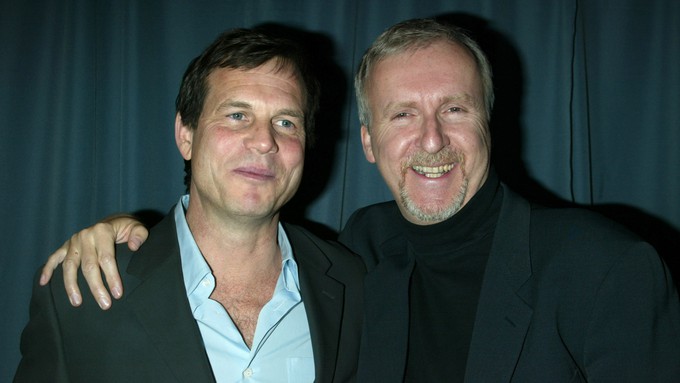
Quint: Did you meet Jim back in the Roger Corman days? Were you both working for Roger in the same time period?
Bill Paxton: Not the first Roger Corman days. I had two Roger Corman days. The first were '74-'76 and then my second Corman days started around 1980. I had gone to New York and I had come back out to LA and I was trying to auditions for acting work, but I was still moonlighting as a set dresser. A very dear friend of mine, a Canadian actor named Phil Granger, who is still active... great actor. He was working on the night crew for this movie called The Quest. He said “Come on down, I think I can get you on the crew. I'm working for this guy named Jim Cameron. He's a good guy.”
So, I went down to meet Jim, Phil introduced me, and I got hired on the night crew. That movie ended up being released under the title Galaxy of Terror. I've never seen the picture, but weirdly enough Grace Zabriskie is in it and I've played her son on Big Love for five seasons! Great actor.
Quint: The movie's good! You should watch it!
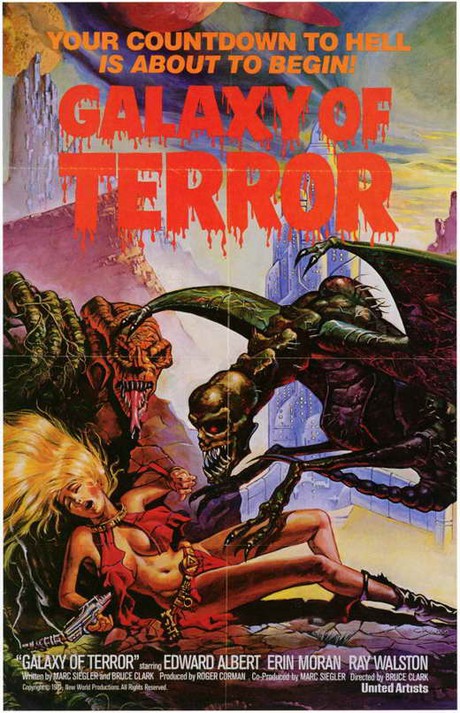
Bill Paxton: Well, I don't know. (Laughs) Anyway, we had a lot of fun working on the sets. That's where I got to know Jim. At the time I made a short that I was able to sell to Saturday Night Live based on a song by Barnes and Barnes called Fish Heads.
We went to a club one night, me and Jim. We used to like to race each other around. He had an Opel GT and I had a Raven and we'd tear ass around, kind of playin' Ditch 'em all over the west side of LA. We went to some place in the Valley to see some band and they were showing Fish Heads with some shorts before the show and I took Jim to see that.
Jim took an interest in me as I did in him in that we both had ambitions beyond the art department, although we both loved the art department and I think we'll die art dogs. He started opening up to me and telling me about this script he had been writing called The Terminator. I said, “Gee, that sounds like a cool idea!” A few years later when he went to make the film he called me up to do a small part and we've had a lot of adventures together over the years.
I mean, God... one of the highlights of my life was going down and exploring the wreck of the Titanic with him in 2001. It's crazy that I ever got to do that.
Quint: You only shot for a day on Terminator, right?
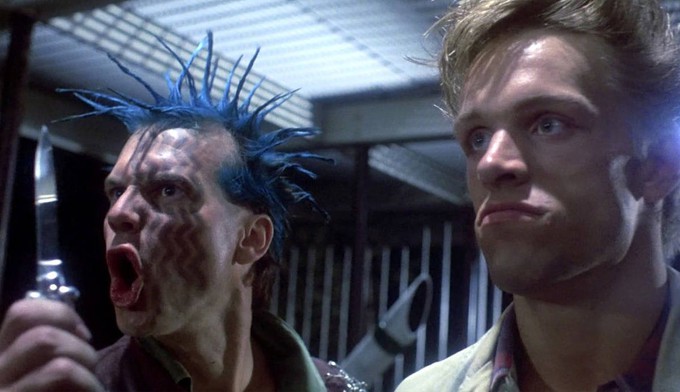
Bill Paxton: Yeah, just for an evening. I came out and we shot up in Griffith Observatory. I was just so excited to be in it, it was an early part for me, but I was also excited for Jim. I had known Jim for four years before he made The Terminator and knew how hard he had worked to get that film made.
I have another kind of claim to fame regarding that. I had done my first studio film, like I said earlier... The Lords of Discipline. There was a Paramount screening a couple of weeks before the film came out and Jim was looking for someone to shoot Terminator and there was a cinematographer who did Lords of Discipline called Brian Tufano, so Jim said “Hey, I'd love to come to that screening because I want to check out Tufano's work.” So, Jim was my guest to that screening.
At that screening I introduced Jim to Rick Rossovitch and Michael Biehn. Subsequently they both auditioned for Jim and were cast in Terminator.
Quint: I did one of these long, career-spanning interviews with Michael Biehn and it's funny you mentioned that his acting style is very internal because he struck me that way in person, too. That made him such a good, atypical fit for a role like Kyle Reese.
Bill Paxton: Yeah, he does play it close to the vest and he's a very private individual, but I admire his dignity and the dignity he brought to all his roles, no matter what he's playing.
Quint: You knew Jim before he was “James Cameron” and worked with him when he wasn't the head honcho on set. Was there anything different you noticed about Jim when you shot your bit on Terminator?
Bill Paxton: Jim is the same guy that I met in 1980. Jim is the constant. Jim has always been the guy that was full on, that understands that life is a one shot deal and he's going to go for the gusto. For me Jim is exactly the same guy that I knew back then, thirty-some odd years ago.
I've always looked at Jim as sort of an older brother, even though we're contemporaries. The last time I was really with Jim was at the premiere of Titanic in London, about a year and a half ago in April. We were there and he had just come from the historic solo dive he made into the Mariana Trench.
We were doing interviews at the Claridge Hotel there and he pulled me aside and we started talking in the hallway. He was describing the dive to me and it never ceases to amaze me the stuff he does. I've always felt privileged that he considers me part of his posse.
Quint: He's a fascinating filmmaker in that there aren't a whole lot of directors who know everybody's job on a film set and probably knows it better than they do.
Bill Paxton: That's for sure! (laughs) That's for sure. I've always loved the story where Jim was shooting Terminator 2 and they were going to take that helicopter and chase the van. You'll notice it's a pretty gnarly shot and it had to be done twice. The camera is following the helicopter following the van from behind and then there's another angle that brings them out from the underpass. I forgot who the camera operator was, but he went to Jim and he said “I'm really uncomfortable about these shots.” Jim said, “That's cool, man. Grab yourself a coffee. I'll operate.” Jim operated those shots!
If you want somebody who will put his money where his mouth is and his balls on the line, that's Jim Cameron.
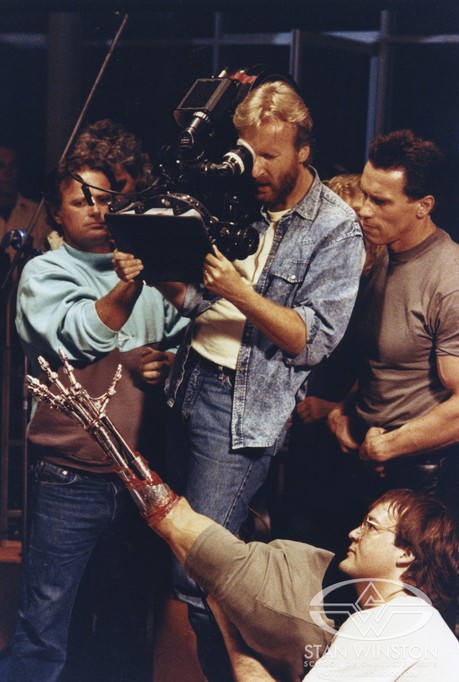
Quint: Growing up, James Cameron was one of my idols. Still is, actually, but I had the chance to interview him before he started on Avatar. We talked about a lot of things, but I kept going back to one of his films, to the point where he turned to me about halfway through and said “You know I've directed other movies besides Aliens, right?” What can I say, I love it.
Bill Paxton: He was a good pick on Aliens. You know, he was very reverential to Ridley (Scott) and the first Alien and he realized the first Alien was a spook house. You don't know where the monster's gonna jump out. So he said he wanted to make the second one more akin to a rollercoaster ride where they're everywhere.
Quint: Here's why I think he's a genius in his approach to that sequel: He takes everything that made the first one work, like the heavily character-centric plot and amazing art design, and he puts it on the skeleton of a completely different kind of movie. There are western elements to it, there's definitely a war movie feel. It's a completely different kind of movie, but he knew what was crucial to making it feel like it belonged in the universe without just giving audiences the same movie they had before.
Bill Paxton: Jim is Jim, boy. Jim is Jim. Still!
Quint: Did he bring you onboard Aliens directly or did you have to go through the system?
Bill Paxton: On Aliens, interestingly enough, I went over to visit my girlfriend, who I've now been married to for 25 years, and I was down there when I got the call that I was going to get to audition for Aliens.
It's kind of a crazy story. I was in a rented flat above a candy shop in Twickenham that my mother-in-law helped my wife and I get for a couple of weeks. I was supposed to audition at Pinewood Studios. I got my sides and was working on them. I remember the alarm clock didn't go off. I woke up at dawn and had to run downstairs to look through the shop windows to see what time it was. I had to take a train into central London in order to take another train back out of London towards Pinewood. Then I had to take a bus and when the bus dropped me off I had to walk about a mile and a half to get to the studios. Just getting to the audition was crazy!
The audition was at about 10 or 10:30am and I got the studio about 9:00. I went and found where the office was and was out in the backlot, kinda where the 007 Stage is, looking over these pages of these scenes that I was going to read.
I remember going in to read for Jim and he was videotaping the auditions himself. He said, “Let's get this scene off its feet” and he handed me this big mailing tube and said “Alright, pretend like this is a pulse rifle.” He took me through it and I was jumping around doing my thing. I left the audition and I didn't hear anything right away and I thought “Oh, God. Your friends are the last people who will hire you.” I thought I had overdone it and didn't expect to get a call from him.
So, I finished my vacation there and came home and Weird Science was just opening. I was doing press for that and Scott Rudin was the head of Fox casting at the time and my name was on a short list of about a dozen actors for the role of Hudson. He and Jim were doing a transatlantic call and my name came up. Scott Rudin said, “Well, Bill's getting some good notices on this John Hughes comedy that's out right now” and Jim said, “I know Bill, I like Bill. Would the studio be cool with that?” They said “Sure.”
So I got a call from Jim around 2 o'clock in the afternoon in Venice, must've been about 10pm in London, and he offered me the part. I was over the moon, to say the least. I was in negotiations to do a Police Academy I Don't Know Which One... they wanted me to sign for a couple of them. At the time it was more money than I had ever seen, but the deal was held up because they wanted a sequel option and all of a sudden I get this call from Jim and he wanted me to come over and do Aliens. That was quite a moment I'll never forget.
Quint: Talk about a branch in the road. How different would your career have been if you had signed on to a couple Police Academy movies instead of Aliens.
Bill Paxton: Well, who the hell knows? (laughs) Jim is a good friend and he's incredibly loyal, but I did audition for Aliens and I auditioned for True Lies. For Titanic he offered me that part. It was funny, I was in Tokyo on a press tour promoting Twister and I got a call from my agent and he said that Jim was looking for me. It's like the Bat Phone ringing. That's the way that I like to describe it. I knew he was casting for Titanic, so I called Jim and said “Whatever it is, I'm in!”
He said, “When are you getting back from Japan?” I said, “I'm getting back at the end of the week.” He said, “Well, why don't you come see me at the beginning of next week, we'll have some lunch and we can talk about it.” I went in and met him at Lightstorm and he talked about it and that was that. I ended up doing the role of Brock Lovett in Titanic.
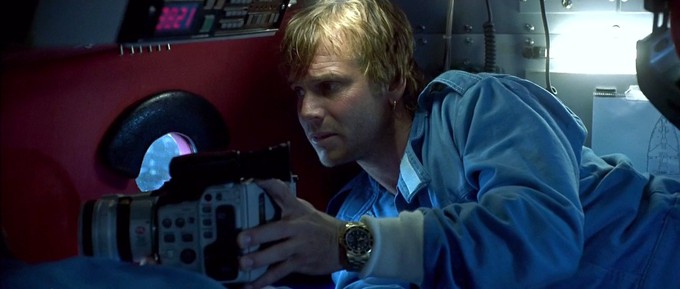
Quint: That's another thing I like about Cameron... That's an old Hollywood way of doing things. He has his own stable of actors, like Orson Welles, John Ford, Hitchcock and so many others did.
Bill Paxton: Yeah, I've always loved that, too. Orson Welles and the Mercury Players. Jim has been kind of my guy. He's the director I've worked for the most. If you think about De Niro with Scorsese... I mean, I'm not in that class, but there's Cary Grant and Jimmy Stewart with Hitchcock. It's great when you work with filmmakers that you know and trust because there's a mutual respect there and you don't have to waste that time kind of getting to know each other. There's a comfort level so there's a trust that makes you much more uninhibited as an actor.
Quint: Did you know when you were making Aliens that everything was coming together? I know it's easy to look at the finished product and say “this is something special,” but could you feel it click while you were making it?
Bill Paxton: Oh, yeah. I mean, just the idea of Jim Cameron coming off of Terminator and doing Aliens... it was so in his wheelhouse. And it was all in the script, Eric. I read the script and I said “This is a classic.”
I remember Jim was flying over from England to do our ADR at Fox and he had them put a cut of the film on videocam so he could watch it and make notes as he was flew over from London. I remember me and Michael Biehn fighting over the (videocam) while we were in the dubbing stage at Fox and we were watching the movie through the viewfinder of this little camcorder. We were watching it and it was basically the size of a little postage stamp and we were going “This is unbelievable!”
So, yes. I did know it was going to be an instant hit and an instant classic.
Quint: It must be a gift for you as an actor to have a character as rich as Hudson. He gets to be big and over the top, but also has this emotional and kind of tragic arc as a character. The second he finds his courage is when he goes.
Bill Paxton: The story of my life, I tell ya'!
Quint: Did you get a chance to know the rest of the squad before filming? Did they bring you guys together?
Bill Paxton: I'll tell you who took me under his wing and was so supportive and so kind to me was Lance Henriksen. We became friends on that show. Everybody was excited to be on the film and everybody was cool. Bill Hope, who I recently have reconnected with by phone, who played Lt. Gorman and Jenette Goldstein, what a first class lady and a great actress. She was living in London. Mark Rolston, what a great guy. Michael, I knew. Sigourney couldn't have been sweeter. She was, again, super supportive.
I always felt like the audience would just be waiting for me to get killed, but she was super supportive of me. I remember little Carrie Hen, sweet little gal. It was her first movie. She was absolutely unforgettable in the part of Newt. It was a very supportive set.
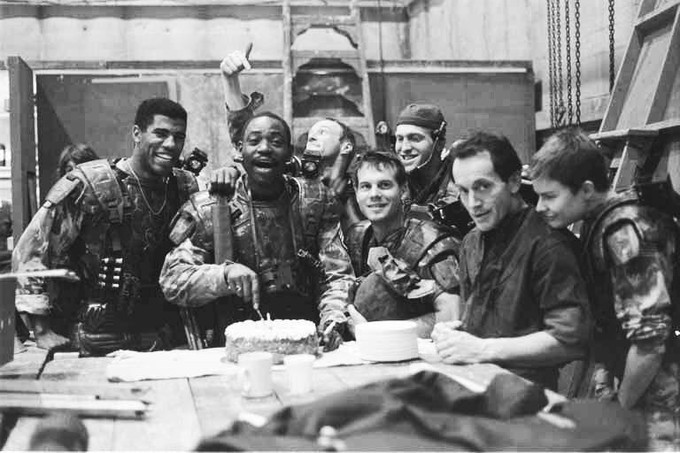
One day we were shooting in the APC and I was doing the speech that was in the director's cut. You know “we'll fry half a city with this puppy” and “sharp sticks” and that whole deal. I looked off camera and standing there is Bill Murray, Steve Martin, Rick Moranis and I think maybe Frank Oz, too.
They were shooting Little Shop of Horrors and they had come over to visit Sigourney or Siggy as her friends call her. It was nerve-wracking enough to do this speech in front of the whole cast and Sigourney and now I look out and I've got all these actors I admire sitting there watching me. It made a little nervous, to say the least.
Quint: That's amazing. I've never heard that story before!
Bill Paxton: I've never told it!
Quint: Were you around when James Remar was cast playing Hicks, before Michael came on to play the part?
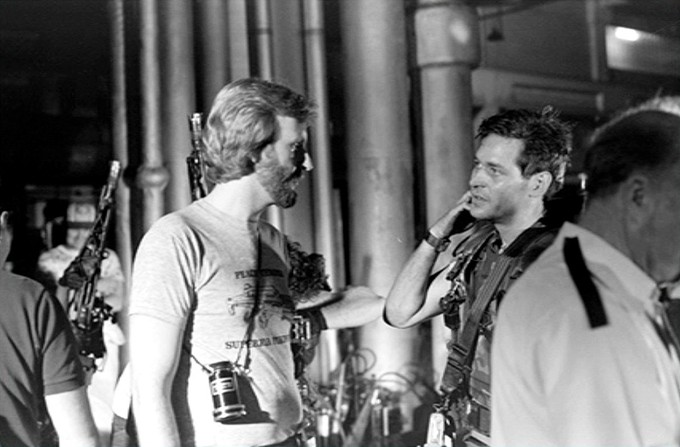
Bill Paxton: Yeah, I was right in the middle of that whole thing. Yes, I was.
Quint: I'm a fan of Remar's work and he's been doing great stuff lately on Dexter, but I just can't see anybody but Michael in the role. It seems to me to be one of those things that worked out for the best.
Bill Paxton: Yeah, absolutely.
Quint: I want to touch a little bit on Stan Winston. You have the distinction of fighting his three most famous creations. As of right now I think you're the only one to have fought an Alien, a Predator and a Terminator.
Bill Paxton: I guess. I didn't fare so well in any arena!
Quint: At least you tried!
Bill Paxton: I just ran into Stan's son at Comic-Con. I hadn't seen him in ages. I was out of the country when Stan passed away and I was unable to attend his memorial, but God... he was a very positive guy and he and Jim had an incredible collaboration. Stan knew how to hold his own with Jim. He always kept his sense of humor. Jim (laughs), he's hard to keep up with. They had a great collaboration.
I remember Stan so well, in England, on that. All of his guys that I worked with, like Shane (Mahan), were such a great group. It was a tragic loss to lose Stan so young.
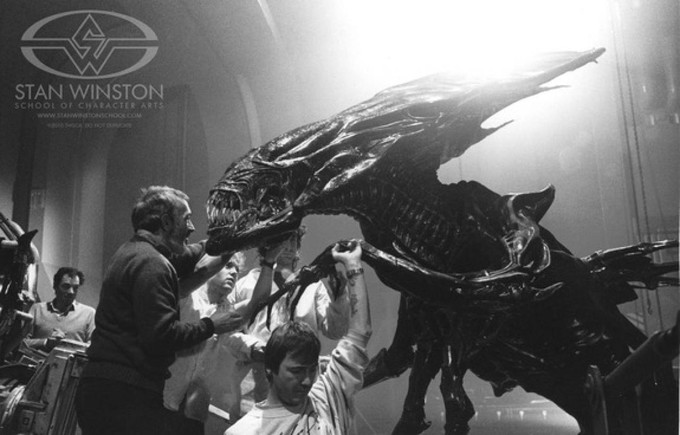
Quint: He was instrumental in creating a whole generation of movie fans. He was responsible for so much of the movie magic that hooked the kids of my generation into the world of film.
Bill Paxton: Absolutely. When you think about the Predator and you think about the Alien... Well, Alien you have to give (H.R.) Giger a lot of credit for that, but these are two of the most famous monsters in modern movie history. I can't think of any two that are bigger than those two. Maybe there are others, but I can't think of them.
I went to visit Lance when Stan was directing Pumpkinhead, which I enjoyed.
Quint: I love that movie! I have a 35mm print of it, I love it so much.
Bill Paxton: Get out of here! That's a collector's item, for sure. How do you project them? Do you take them down to the Alamo Drafthouse?
Quint: That's exactly it. They very kindly store most of my collection there and will let me run them through the projectors every once in a while.
Bill Paxton: I had a good time screening Frailty down there a few years ago and doing a Q&A.
Quint: I love Frailty. You should come back out. We should do an event in Austin.
Bill Paxton: Absolutely, but I gotta drill a few more wells first. I've always been someone that by the time I finish up a film I'm riding out of town. I don't really rest on my laurels as much. It's fun once in a while to take a look back, but I don't want to look back too much because they might be gaining on you.
Quint: Well, I'll only ask you to look back for a little bit longer, I promise. One movie that I want to bring up that I doubt very much you get asked about too often is one of my favorite weird-o '80s horror movies called Butcher Baker Nightmare Maker.
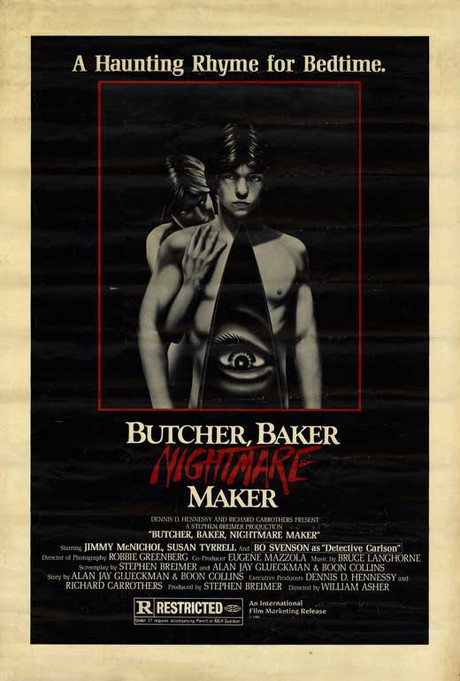
Bill Paxton: God, I'll tell you what. It's so funny you should mention that film. The guy who edited that movie is a guy named Ted Nicolaou. He's an old, old friend of mine who I've recently reconnected with. That opening sequence, with the lumber truck and the parents on the road, is right up there! It's a damn good piece of cutting and a great sequence.
That was directed by William Asher, who directed some of the beach blanket movies. He directed a lot of the I Love Lucys. He was kind of at the end of his career then. Another thing about that movie is it features one of the most eccentric actresses I ever met, Susan Tyrrell. My God, she's quite a character.
I got to play Eddie, the bully, and that was a lot of fun for me.
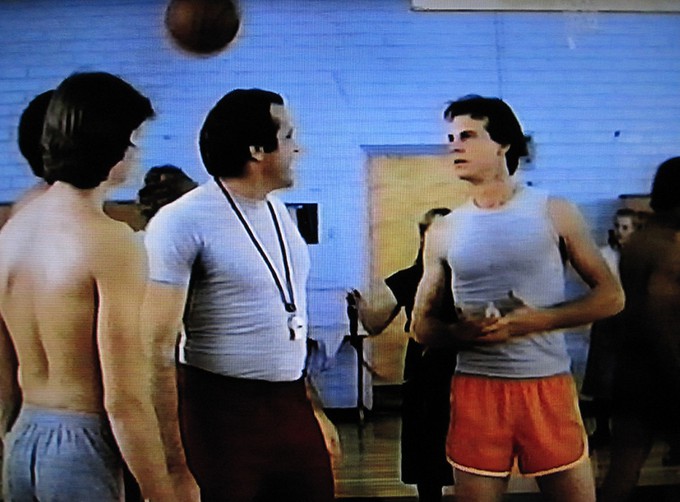
Quint: One of the reasons I love that movie so much is you not only have Susan Tyrrell off her rocker nuts, but you also have Bo Svenson who is kind of matching her level of crazy throughout.
Bill Paxton: Oh, God yes. Bo Svensen. He always had a big-ass German Shepherd with him. These actors, they drank their own Kool Aid and they kinda became caricatures of themselves.
Quint: Wow, so Bo Svensen was like that in person, huh?
Bill Paxton: Yeah. I wasn't around him that much, but I remember him and his big-ass dog. What male actor brings a dog to work, for God's sake?
Quint: He has a dog in the movie. Is that his dog?
Bill Paxton: Oh, maybe that's his fuckin' character's dog. I don't know. You know what, it's going back so long it's all melding together.
Quint: It's just such a weird, random, fun movie... and oddly progressive. I don't know if you've seen it recently... but you have a lot of people calling people “gay” and “fag” like you'd expect from movies of that era, but the coach character is gay and is one of the heroes of the film... probably the only wholly good person featured in the movie, actually.
Bill Paxton: Well, I remember one of the producers was gay on the film. Who knows? It's been so long. I do remember the guy who played the coach. His name was Steve Eastin. Yeah, it was a fun movie. I remember it was called Night Warning, then it was called Butcher Baker Nightmare Maker. Do you know what title it was actually released under?
Quint: I think it saw release under Night Warning, but the first time I saw it was through Quentin Tarantino who showed a 35mm print of it here in Austin that had the Butcher Baker Nightmare Maker title.
Bill Paxton: He had that one?
Quint: Yep! He's a big fan of it!
Bill Paxton: Oh, God. Well, he has yet to call me up. I'm waiting for a call from Quentin. Quentin, buddy, come on! When are you going to throw me a bone? He's one of the few filmmakers I haven't worked with.
Quint: Before I let you go we have to talk about Weird Science. I think it's the first time I noticed your work as a young film fan...
Bill Paxton: I think that's the first time anybody kinda saw me. I had a pretty sizable role. It was definitely a best supporting role. I remember the audition, going over to the Universal lot because John Hughes had a big bungalow there. It was the same bungalows that Hitchcock and Robert Aldrich had at one time. John was already very successful at Universal.
I remember auditioning and getting a call back, then reading for John. It was at a time that I kind of realized that... you know, screenplays are really blueprints. They're not written in stone. There's room to play around. I've had some success improvising, but when I say “improvising” I'm not thinking up stuff right on the spot, but coming in with a few other alternative ways to go or sometimes voicing subtext.
So, I threw in a bunch of stuff and that's what really caught John Hughes' attention. He was a midwesterner, like my dad was and a lot of the great lines that I have in Weird Science were lines that I remember my father saying to me growing up, particularly things like “how about a nice greasy pork sandwich served in a dirty ashtray” or “I didn't think it was a whale's dick, honey.” That kind of stuff. My dad had a pretty dark sense of humor.
A lot of the old expressions I was using in that movie, like “the boozehounds return” was the kind of stuff that John and I had grown up with, sort of these old kind of midwestern sayings. John and I got on like a house on fire.
I also had a ringside seat to see the great collaboration that John and Anthony Michael Hall shared. They could literally finish each others' sentences. I remember them sitting around, talking about some of the scenes and they were topping each other. One scene they were talking about was the shower scene, where they're taking a shower with her with their clothes on. The camera goes closer and closer to just their lips. I remember him and Michael kicking that around. They both had ideas for it.
I started hanging out during pre-production and I remember one day being there at the bungalow and John wanted to show Michael The Breakfast Club. It was finally finished and I sat in the Hitchcock screening room and watched The Breakfast Club with John and Michael the first time Michael saw it, which was a real treat.
Quint: Oh wow.
Bill Paxton: It's a great movie, a seminal movie. I turned down a job that I probably should have taken. Richard Edson ended up taking it, the car parking guy in Ferris Bueller. I never had any contact after that. I don't know... I was always hoping to work with him again. I had a lot of fun with him.
Chet was one of those characters, too, kinda like Earl in 2 Guns, where I kinda put the whole thing together, showed up on the set and right after the first take of the first scene it was obvious the character was working and firing on all cylinders. John and (producer) Joel Silver were very excited.
I figured it out with John that Chet had gone to military college and he'd come home for the weekend and he was obviously too glad to be the parent while the parents were gone, who he had always bullied. I was in the makeup trailer with Michael Germain, who was a very famous hair stylist. Michael and I had worked on Streets of Fire a year before, in which I had a small part.
I convinced Michael to give me that flat-top. I wanted to have a haircut that makes a statement with this guy. It's gotta be military. He suggested the idea of a flat flat-top that's still a little long on the sides so it could still be waxed on the sides. I said “That's for me,” and he said, “Wait a minute, I gotta get John and Joel Silver to approve this.”
Now, I had learned a long time ago you don't want to ask for something, you want to show them. You know, before a scene you don't want to tell a director “I'm thinking about playing this scene this way” or “doing this line like this.” You just do it. They'll say “stick to the script” or whatever so you gotta show it to them in a spontaneous, real way and they'll usually love it. If it works.
So, I begged Michael “just cut it. You gotta cut it.” He said “You're going to get me fired!” I said, “You're not going to get fired. I promise. You're going to get a fuckin' raise.” So he cut it and waxed it, then I put on my outfit.
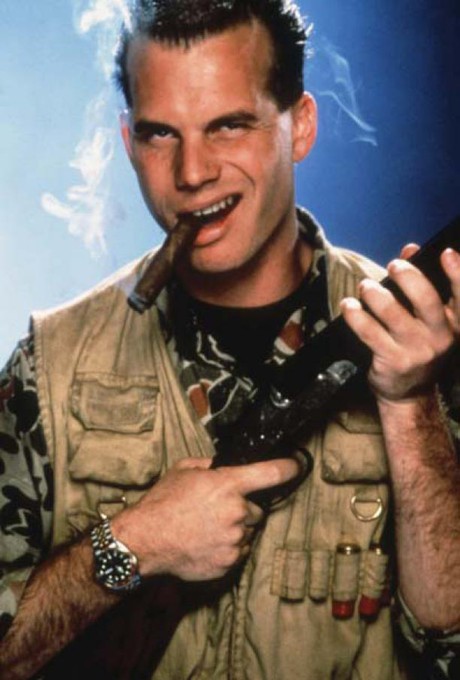
The first thing I did was an exterior shot where I drive up to our house. I drive up and I get out of the car and I got this shotgun in one hand and this mallard by the neck in the other and I walk by and see the Maserati and the other car in the driveway and I walk by them and into the house. That was one of the only things I shot in Chicago and that was in the first week of filming.
Just the walk from the car to the door, John and Joel and everybody were like “Oh, yeah. We love this guy! We love this character!” I get kidded a lot about Chet, but it's something to have played a character that almost 30 years later people are still talking about. Same with Hudson. It's gotta be a high compliment that these characters have resonated through time like that.
Quint: Here's the thing: both of those roles could have been legendarily hated characters if played differently.
Bill Paxton: Yes. I always try to bring a little relish to it. You gotta play the villain as a hero. I was really shocked to learn of John's passing a couple of years ago, like the rest of the world. He still had so much more to give and I was always hoping we would end up working together again. I should have taken the part in Ferris Bueller! At the time my agent balked, said “You've done a bigger part in the previous movie.” I should have said “Screw that! I want to go work with John.”
In hindsight I should have done Ferris Bueller, but I was taking the good advice of my agent at the time. I was trying to build up into bigger roles, but I always regretted not doing the part, but I thought Richard Edson killed it anyway.
Quint: John Hughes had a talent for handling absurdity in a way that we hadn't really seen since maybe the Blake Edwards Pink Panther films or the screwball comedies of the '30s. You don't see people making movies that absurd these days... at least intentionally!
Bill Paxton: I think Judd Apatow has been kind of the heir apparent to John Hughes.
Quint: He gets the heart, for sure, which is crucially important, but there's just a line that Hughes knew how to cross that is unmatched. I mean, your character in Weird Science turns into a toad monster!
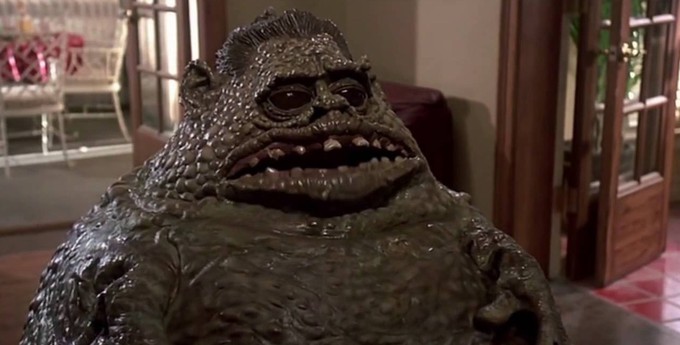
Bill Paxton: Oh, that was great. We had a lot of fun with that.
Quint: Were you on set with that creation?
Bill Paxton: Oh, yeah. I was there. I'm trying to remember the guy who did the effects for that show... Reardon?
Quint: Oh, Craig Reardon.
Bill Paxton: Craig Reardon! I remember when I had to do the headcast. They were hoping to see my actual eyes in the thing. I was initially shooting in the kitchen as Blob and I was inside the suit with two little people who were moving the arms while I was moving the face, but literally the three of us were suffocating in there. It wasn't working. It was better for them to stay in suit and manipulate it and for me to do the voice in ADR. I stood off camera doing the voice and they would kind of parrot it.
But while I was inside of Blob Chet with these two little people, one of the guys... I forget his name, but it turned out he went to high school with my brother in Texas. It was so bizarre to make one of those six degrees of separation connections while we're in this giant latex suit!
Quint: Let's close out talking about your comic book...
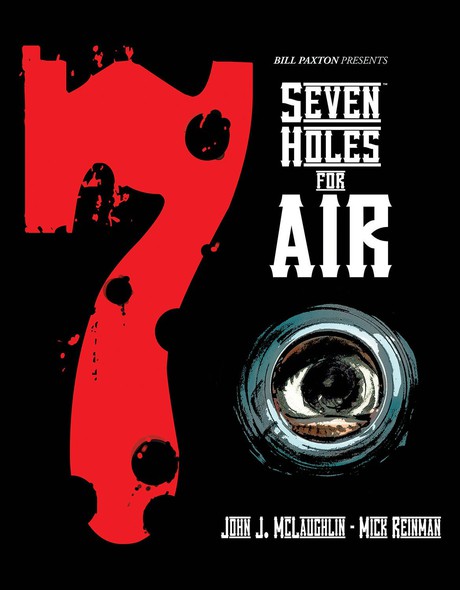
Bill Paxton: It's called 7 Holes For Air and it's based on a script of the same name by John J. McLaughlin. John wrote Hitchcock last year. He wrote Parker. He's a writer who is a good friend and colleague I've been working with for a few years. This is a spec script he wrote that I fell in love with and I thought “let's turn this into a movie, but let's do it as a graphic novel first.” At least people can start enjoying it. We signed with a company called Arcana and it's coming out in mid-September at your better comic book and book shops.
The guy who did the art is a dear friend of mine, a guy named Mick Reinman. He did all of my storyboards on The Greatest Game Ever Played.
Also, I was hired by Legendary two years ago to develop and direct a new movie franchise based on Kwai Chang Caine from Kung Fu, the David Carradine series, and I got Legendary to hire John McLaughlin to write that screenplay, which he did and it is great. Mick Reinman's been storyboarding that for the last year. That's my next big thing I'm going to do and that's for Legendary East when that company finally solidifies, which is coming together now. I'll shoot that movie in China.
Quint: I know Thomas Tull a little bit...
Bill Paxton: Great guy!
Quint: He definitely comes across as one of us.
Bill Paxton: He is one of us. The first time I met him I was so impressed with him. I went to him to try to make a sequel to Twister. I put him together with Kathy Kennedy, but halfway through the first meeting I just said “You have to forgive me, but regardless of a Twister sequel I want to work for you!” We've gotten to be friends and I'm really looking forward to directing Kung Fu for them.
Quint: That's awesome, man. Any more movies from you is good news.
Bill Paxton: I've also got Edge of Tomorrow, which is formally known as All You Need Is Kill, in the can. That's coming out next June and I just finished Million Dollar Arm, made by the producers who did The Rookie and Miracle and Invincible and I support Jon Hamm in that.
Quint: I was there at Comic-Con when they showed the footage from Edge of Tomorrow. It looks great!
Bill Paxton: Oh, you were? How about when Tom pulled me up on stage!?!
Quint: I was actually sitting in the row behind you and I had no idea you were there until that happened.
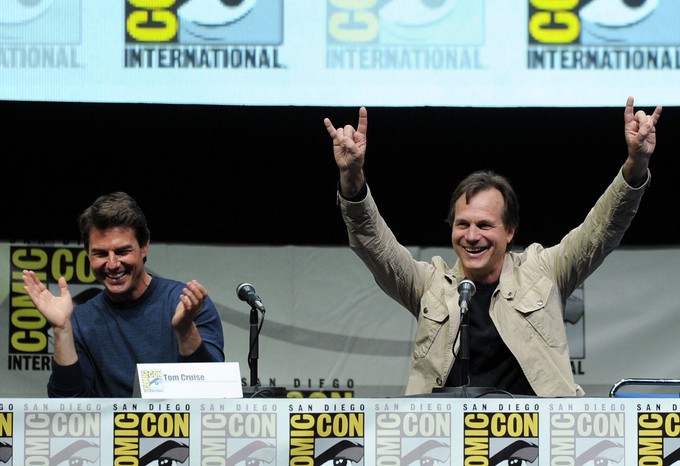
Bill Paxton: I started to go around and thought “I can't go all the way around,” so I just decided to jump up on stage. I climbed up and was convinced I was going to fall and break my leg. Tom and I got on very well, as you can see. Tom had me doing Aliens and Weird Science lines all the time. When I did the line from Aliens, man... the roar in that room, that Hall H, was unbelievable.
Quint: You're a rock star, man!
Bill Paxton: Well, I don't know about that, but listen, I gotta wrap this up. It's been really great to talk to you. I sure have enjoyed this conversation, I've enjoyed your company. You helped me get all the way down the 405!
Quint: It's been a pleasure, man. We didn't get to some of my favorite stuff from you... I love Twister, Club Dread and, my favorite performance of yours, A Simple Plan, but maybe we can do another one of these?
Bill Paxton: Oh God, yeah. Feel free to follow me up. Make sure to give Harry my best. Thanks again, Eric!
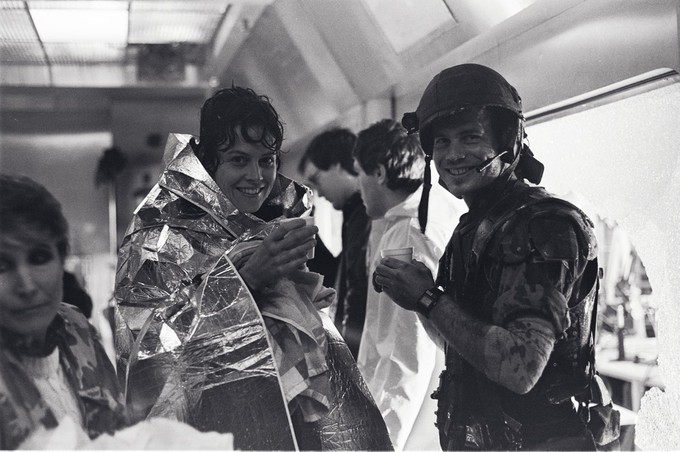
Thanks for making it all the way through that monster of an interview. It was surreal going through the transcription so closely after Paxton left us, but I'm happy to have revisited my brief time with the man. He left us way too soon.
-Eric Vespe
”Quint”
quint@aintitcool.com
Follow Me On Twitter

